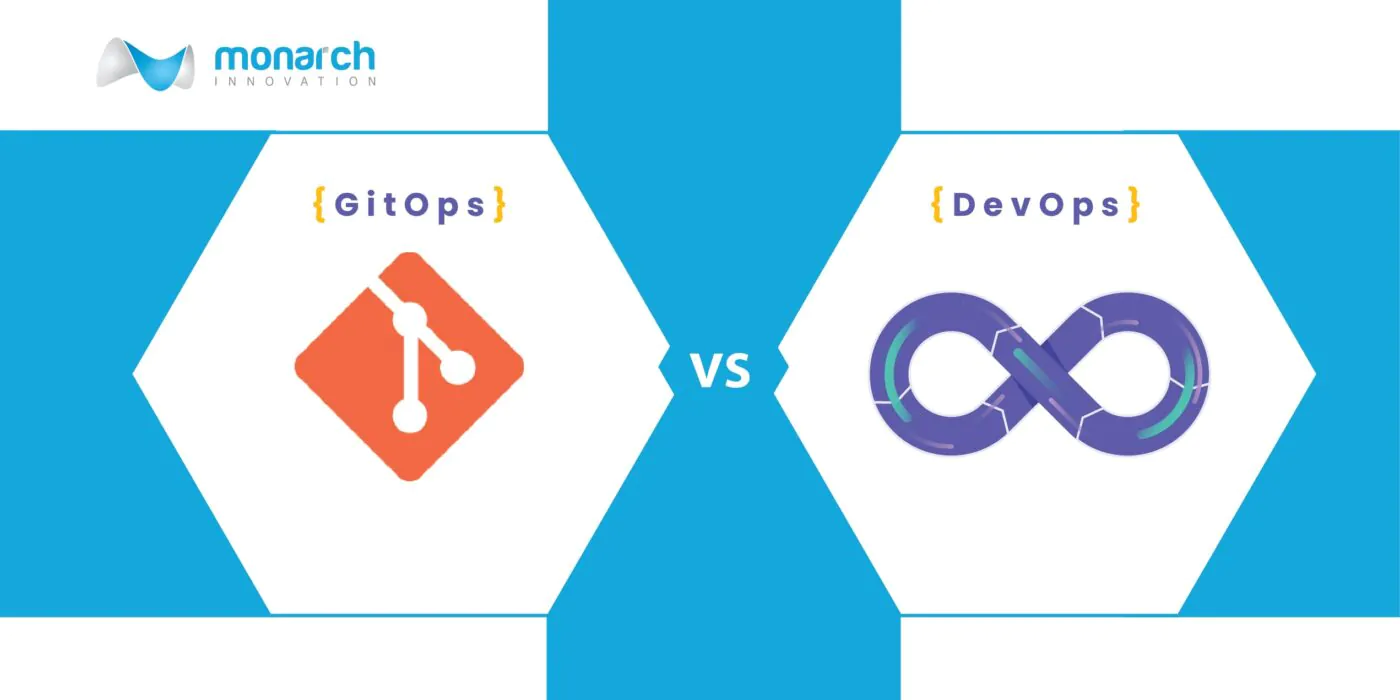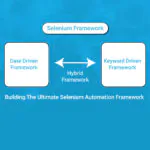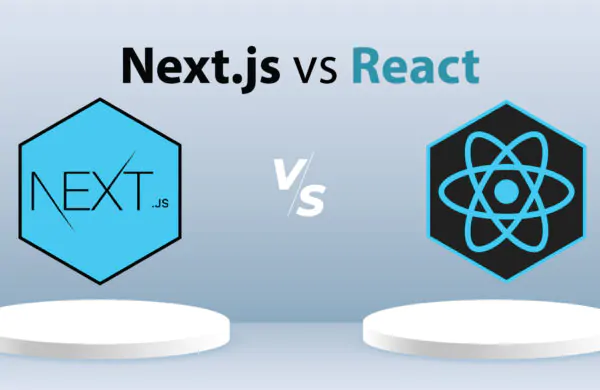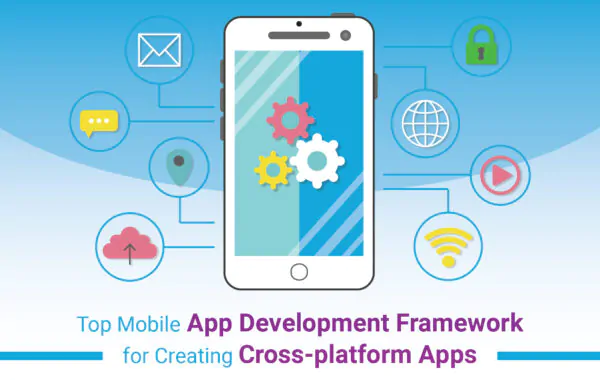Introduction
In the world of software development, two powerful methodologies, GitOps and DevOps, have emerged to streamline processes and enhance collaboration. While they share common goals, GitOps and DevOps differ in their approaches and strengths. This article will break down the key differences between GitOps and DevOps, shedding light on how each methodology contributes to the seamless delivery of software development solutions.
What is GitOps?
GitOps is like giving the software a magic wand. It’s a way to manage all the instructions (code and settings) in one special place called a “Git repository“. It is possible to manage and update software. When you want to change something in the software, you simply update the instructions in the repository, and the software automatically adjusts itself to match the new instructions. It’s like making a wish, and the software grants it without any extra effort.
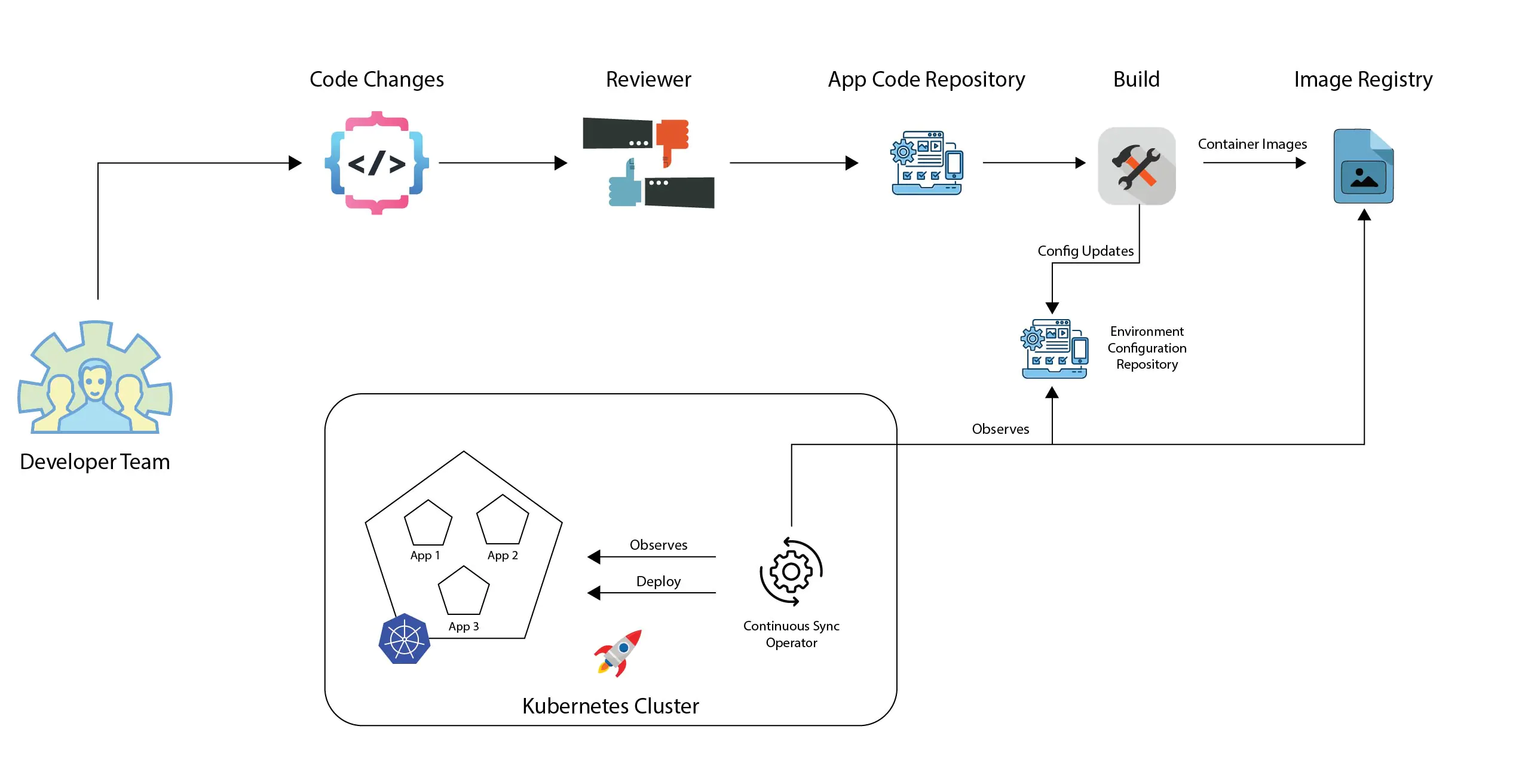
What is DevOps?
DevOps is a modern way of developing and delivering software. It involves teamwork between developers and IT operations to make the process faster and smoother. By using automation and collaboration, DevOps helps create and release software more efficiently and with fewer problems.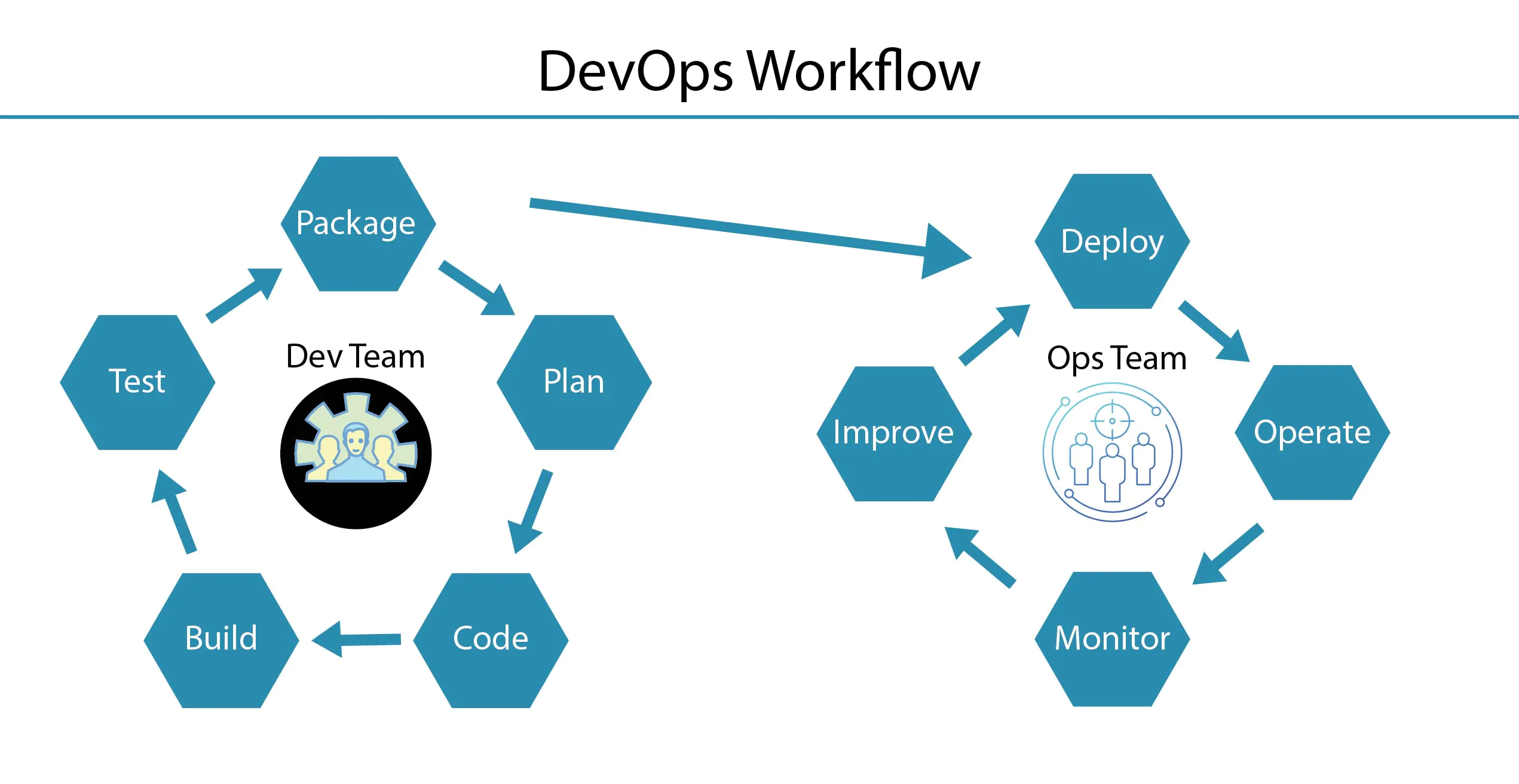
DevOps vs GitOps
| Aspect | DevOps | GitOps |
| Approach | Collaborative approach with teams working together for continuous integration and delivery. | The code-driven approach is where systems automatically adjust to match code stored in repositories. |
| Automation | Automation is important for faster software development, testing, and deployment. | Automation is central, with systems checking and adjusting themselves based on code in repositories. |
| Infrastructure | Managed through scripts and automation tools for provisioning and scaling. | Infrastructure state controlled through code in version-controlled repositories. |
| Deployment | Focuses on automating the deployment pipeline to ensure faster and more reliable software releases. | Automated deployment is a key feature, where systems continuously adjust to code-defined desired state. |
| Collaboration | Emphasizes teamwork, communication, and collaboration across development, operations, and other teams. | Emphasizes having correct code in the repository, with less focus on extensive teamwork. |
| Change Management | Offers traceability through automated tools, with an emphasis on smooth and quick development and deployment. | Provides strong traceability and auditing by recording every change in the version-controlled repository. |
| Cultural Shift | Promotes a cultural shift towards collaboration, shared responsibility, and continuous improvement. | Encourages automation and consistency as a way to manage systems more efficiently. |
| Tool Usage | Involves a wide range of tools for automation, monitoring, CI/CD, and collaboration. | Centers around Git repositories often integrate with Kubernetes and other automated tools. |
What Are the Key Tools in GitOps vs DevOps?
GitOps and DevOps are methodologies that involve various tools to achieve their respective goals in software development and deployment. Here are some of the main tools associated with each approach:
GitOps Tools:
- Flux: A popular GitOps tool that automates the deployment and management of applications and infrastructure using Git repositories.
- ArgoCD: A declarative, GitOps continual delivery tool that helps manage the application lifecycle on Kubernetes.
- Jenkins X: An opinionated DevOps platform that automates CI/CD pipelines, designed specifically for Kubernetes applications.
- Tekton: A Kubernetes-native framework for creating CI/CD systems, providing a set of building blocks for automating workflows.
- Helm: A package for Kubernetes that simplifies the deployment and management of applications through charts.
DevOps Tools:
- Jenkins: An open-source automation server that facilitates building, testing, and deploying software.
- Travis CI: A cloud-based CI/CD service that automates the building and testing of code changes.
- CircleCI: A platform that automates software testing and deployment processes, supporting various programming languages.
- GitLab CI/CD: A built-in CI/CD tool integrated with GitLab, allowing for seamless automation of software pipelines.
- TeamCity: A versatile CI/CD tool that supports various technologies and provides integration with popular version control systems.
- Ansible: An automation tool that focuses on configuration management and application deployment.
While these are just a few examples, both GitOps and DevOps utilize a wide range of tools to achieve their objectives. GitOps tools emphasize version-controlled deployments and declarative configurations, ensuring a clear and consistent desired state. DevOps tools focus on automating various stages of the software development lifecycle, promoting collaboration between development and operations teams to achieve rapid and reliable releases. The choice of tools will depend on your organization’s specific requirements, preferences, and the methodology you choose to adopt.
GitOps and DevOps each offer distinct advantages in the realm of software management:
GitOps Advantages:
- Enhanced Control: GitOps provides meticulous control through version-controlled configurations, ensuring consistent and auditable deployments.
- Visibility: The declarative approach of GitOps offers unparalleled visibility into the desired system state, enabling easy tracking and troubleshooting.
- Traceable Changes: With GitOps, every change is documented, reviewed, and stored in a Git repository, facilitating accurate change management.
- Collaboration: GitOps promotes collaborative development through pull requests, enabling efficient team coordination and minimizing errors.
- Reproducibility: Version-controlled infrastructure-as-code in GitOps ensures reproducibility, allowing precise replication of deployments.
In short, GitOps is like having a detailed plan for everything you do. It helps you control changes and see what’s happening clearly. You can track all the changes and work together smoothly. It’s like having a map that guides you step by step.
Also Read:- GitLab vs GitHub: Difference Between GitHub and GitLab
DevOps Advantages:
- Automation: DevOps tools streamline workflows through automation, accelerating software delivery and reducing manual intervention.
- Continuous Integration/Delivery: DevOps facilitates continuous integration and delivery, enabling frequent and reliable code releases.
- Cross-Functional Teams: DevOps breaks down silos, promoting collaboration between development and operations teams for efficient problem-solving.
- Rapid Feedback: DevOps encourages quick feedback loops, aiding in identifying and addressing issues early in the development cycle.
- Scalability: DevOps supports scalability by automating processes, ensuring software can handle increased demands.
In simple language, DevOps is like having a team of fast helpers who work together to get things done quickly. They use special tools to make sure everything runs smoothly. It’s like having a group of friends who help each other out to finish tasks faster.
GitOps is great for keeping things organized and visible, while DevOps is perfect for getting things done quickly with the help of automation and teamwork. The choice depends on what you need for your projects.
What Is the Primary Focus Difference Between GitOps and DevOps?
GitOps Focus:
GitOps is all about keeping things organized and making sure everyone follows the same plan. It uses a special book (like a computer program) to control how things are done. Changes are carefully reviewed, and we can see what’s always happening. It’s like having a clear path to follow and knowing exactly where we’re going.
DevOps Focus:
DevOps is like a team of fast workers in a kitchen. They want to make food quickly and work together well. Automation is their secret ingredient – they use special tools to make things fast and smooth. It’s like having a bunch of helpful friends who know how to get things done fast and efficiently.
In short, GitOps is about organized control and clear directions, while DevOps is about quick teamwork and using tools to get things done faster. The choice depends on how you want to approach your projects.
Why and When You Should Use GitOps:
Why Use GitOps:
- Control and Visibility: GitOps gives you tight control over your software and a clear view of what’s happening. It’s like having a detailed graph for your journey.
- Versioned Configurations: GitOps keeps track of every change, like a history book for your software. You can easily go back in time if needed.
- Consistency: With GitOps, everyone follows the same plan, reducing confusion. It’s like a recipe that ensures every dish turns out perfect.
When to Use GitOps:
- Kubernetes or Cloud Apps: If you’re working with Kubernetes or cloud applications, GitOps keeps things organized and in sync.
- Complex Environments: For projects with many moving parts, GitOps helps maintain order and consistency.
- Auditing and Compliance: In regulated industries, GitOps’ clear history and control are invaluable.
Key Difference: GitOps is Ideal for Precise Control and Clear History
Why and When You Should Use DevOps:
Why Use DevOps:
- Speed and Efficiency: DevOps tools turbocharge your work, making things faster and smoother. It’s like having a team of fast and skilled workers.
- Collaboration: DevOps promotes teamwork and communication, like a well-coordinated orchestra playing in harmony.
- Automation: With DevOps, repetitive tasks are automated, reducing manual effort. It’s like having robots to help with the heavy lifting.
When to Use DevOps:
- Frequent Changes: If you need to make changes often and want them delivered swiftly, DevOps is your go-to approach.
- Team Projects: For collaborative projects, DevOps ensures everyone is on the same page, working efficiently together.
- Speedy Delivery: When you want to release software quickly while maintaining quality, DevOps shines.
Key Difference: DevOps Focuses on Speed, Collaboration, and Automation
In conclusion,
The choice between GitOps and DevOps depends on what your organization truly needs, priorities, and cultural alignment. GitOps is like having a detailed plan that ensures precise control and a clear record of changes. On the other hand, DevOps is like having a speedy team that collaborates well and uses tools to get things done quickly. By understanding these methods and what they’re good at, you can confidently choose the best path for managing software and achieving successful results in your projects. Imagine the software world as a vast sea – with GitOps as a steady sail guiding you with precision, or DevOps as a powerful engine propelling you forward with speed. It’s up to you to steer towards excellence in software, making your journey a successful one.
Are you curious about how GitOps and DevOps may facilitate developer productivity? To find out how our team can help, contact us right away.
FAQs
How does GitOps differ from DevOps?
GitOps focuses on version-controlled deployments and automated adjustments based on code changes. DevOps emphasizes collaboration, automation, and rapid software delivery across development and operations teams.
How do I choose between GitOps and DevOps?
The choice depends on your organization’s needs, priorities, and cultural alignment. GitOps provides precise control and clear history, while DevOps focuses on speed, collaboration, and automation.
Which tools are associated with GitOps and DevOps?
GitOps tools include Jenkins X, Flux, Tekton, ArgoCD, and Helm. DevOps tools encompass Jenkins, Travis CI, CircleCI, GitLab CI/CD, TeamCity, and Ansible.
Is GitOps or DevOps better for complex projects?
GitOps is particularly useful for maintaining order and consistency in complex projects with multiple moving parts, ensuring that desired configurations are accurately deployed and managed.

